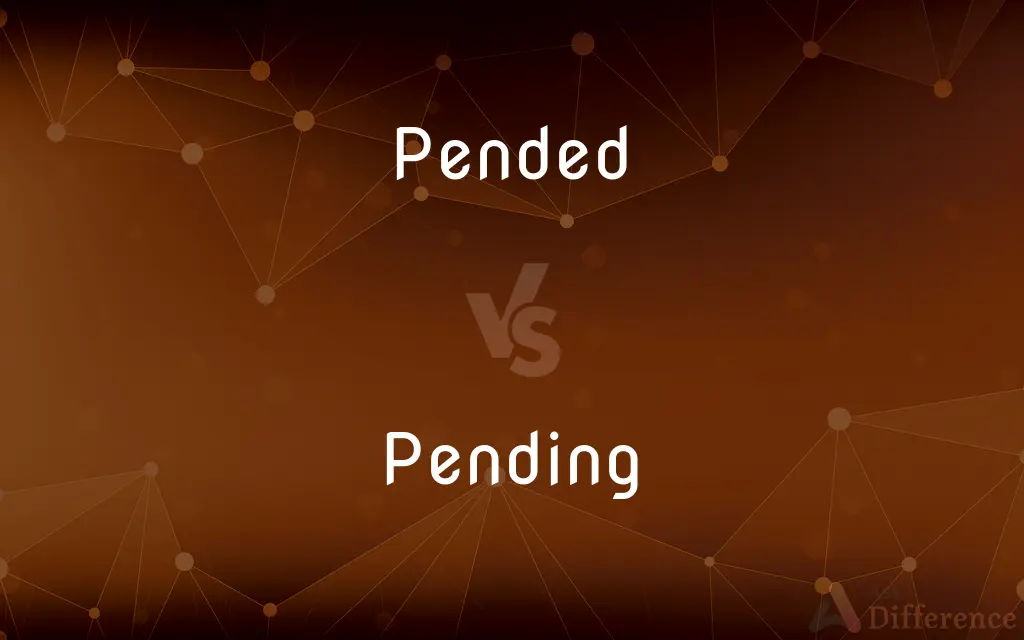Pended vs. Pending — What's the Difference?
By Urooj Arif & Fiza Rafique — Updated on February 27, 2024
Pended refers to something that has been put on hold or delayed, typically in the past tense, indicating a temporary status. Pending implies an ongoing state of waiting or not yet resolved, often used to describe current situations.

Difference Between Pended and Pending
Table of Contents
ADVERTISEMENT
Key Differences
Pended is used to describe actions or matters that were previously put on hold or delayed and is often seen in formal or legal contexts. It signifies a specific instance in the past where a decision or action was deferred. Pending, conversely, describes current situations that are awaiting a decision or conclusion, indicating that the matter is still in progress and has not yet been resolved.
Pended is used retrospectively, referring to a situation that has already occurred but was not completed or resolved at that time. Pending looks forward, pointing to the future resolution of an ongoing matter. This distinction highlights the difference in the timeline focus between the two terms.
The usage of pended might be less common in everyday language, primarily appearing in technical or bureaucratic contexts. It emphasizes that something was intentionally set aside to be addressed later. Pending is more widely used, applicable in various situations from legal cases to everyday tasks, and suggests that something is in the queue for consideration or action.
Pended can imply that the action or decision has moved out of its holding pattern, either towards resolution or further action, based on the context it's used in. Pending suggests that no such movement has occurred yet, maintaining the status of awaiting action or decision without implying any progress towards resolution.
Despite their differences, both terms convey a lack of finality or conclusion. However, the key distinction lies in their temporal focus pended looks back to what has been delayed, while pending looks forward to what is yet to be resolved.
ADVERTISEMENT
Comparison Chart
Temporal Focus
Past, referring to previous delay
Present/future, awaiting outcome
Usage Context
Formal, legal, technical
Broad, including everyday language
Connotation
Action has been delayed
Action or decision is awaited
Progress Implication
Suggests movement out of delay
Implies current state of wait
Commonality
Less common in everyday use
Widely used across contexts
Compare with Definitions
Pended
Suggests a temporary halt in the past.
Funding for the initiative was pended during the budget review.
Pending
Indicates an ongoing state of uncertainty.
Pending applications will be reviewed next week.
Pended
Indicates a past decision to hold or defer.
The project's approval was pended last month.
Pending
Suggests anticipation of a future outcome.
Pending results will determine our next steps.
Pended
Used retrospectively in formal contexts.
The case was pended awaiting further evidence.
Pending
Applies to awaiting actions in various contexts.
Your request is pending approval.
Pended
Implies previous deferral for later action.
The proposal was pended until more data could be gathered.
Pending
Used for matters in progress or not yet decided.
The contract remains pending signature.
Pended
Refers to actions or matters previously delayed.
The application was pended due to incomplete documentation.
Pending
Describes situations awaiting resolution.
The decision on the new policy is still pending.
Pending
Pending is a district in Kuching, Sarawak, Malaysia. Administratively, it is in the Kuching South City Council area.
Pending
Not yet decided or settled; awaiting conclusion or confirmation.
Pending
During; as, pending the trail.
Pending
Awaiting conclusion or confirmation;
Business still pending
Common Curiosities
What does it mean when something is pended?
When something is pended, it means that it was put on hold or delayed at a previous point in time.
Can a matter be pended and then become pending again?
Yes, a matter can be pended as a past action and then become pending again if it is currently awaiting resolution.
Is "pended" commonly used in everyday language?
No, "pended" is less common in everyday language and is more often found in formal or technical contexts.
What does pending mean in a legal context?
In a legal context, pending indicates that a case or matter is still in progress and awaiting a decision or resolution.
How does the usage of pending differ from pended?
Pending is widely used to describe current situations awaiting an outcome, while pended refers to past instances where something was delayed.
Do pended and pending have positive or negative connotations?
Both terms are neutral, focusing on the status of delay or awaiting; the connotation depends on the context in which they are used.
Is there a difference in how pended and pending are used across industries?
Yes, the usage can vary by industry, with "pended" being more technical or legal, and "pending" being broader and applicable in various contexts.
What does it mean if a payment is pending?
If a payment is pending, it means it has not yet been processed or cleared and is awaiting completion.
Does pending mean the same as in progress?
Pending and in progress are similar, but pending specifically implies waiting for a decision or action, while in progress might not necessarily involve waiting.
Can a project be both pended and pending?
A project might have been pended at a past point (action was delayed) and could be pending currently, indicating ongoing deliberation or awaiting further action.
Does pending always imply a future decision will be made?
Yes, pending generally implies that a decision or action is expected to occur in the future regarding the matter in question.
How can one determine if a situation is pended or pending?
The determination depends on the timeline: if the action or delay occurred in the past, it is pended; if it is currently awaiting resolution, it is pending.
Can an application be pended due to errors?
Yes, an application can be pended if there are errors or incomplete information, requiring correction before proceeding.
Are there specific actions to take when a matter is pending?
When a matter is pending, it may require monitoring, additional information, or specific actions to move towards resolution.
How can the status of pending be resolved?
The status of pending can be resolved through action or decision that addresses the matter at hand, moving it towards completion.
Share Your Discovery

Previous Comparison
Domain vs. Demesne
Next Comparison
Demasculinize vs. EmasculateAuthor Spotlight
Written by
Urooj ArifUrooj is a skilled content writer at Ask Difference, known for her exceptional ability to simplify complex topics into engaging and informative content. With a passion for research and a flair for clear, concise writing, she consistently delivers articles that resonate with our diverse audience.
Co-written by
Fiza RafiqueFiza Rafique is a skilled content writer at AskDifference.com, where she meticulously refines and enhances written pieces. Drawing from her vast editorial expertise, Fiza ensures clarity, accuracy, and precision in every article. Passionate about language, she continually seeks to elevate the quality of content for readers worldwide.
















































